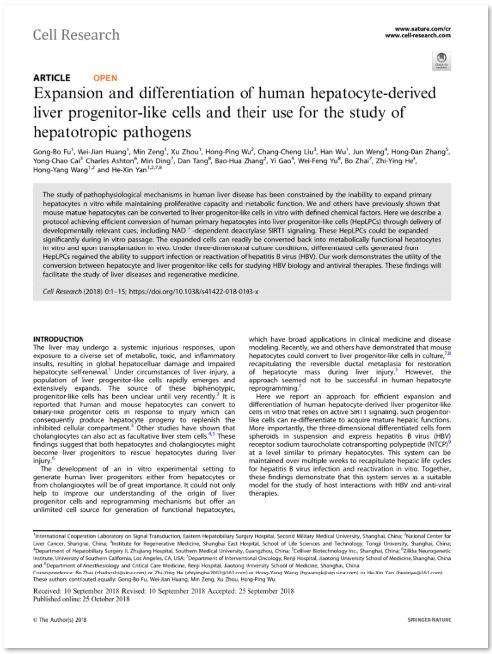13.11.2019
Expansion and differentiation of human hepatocyte-derived liver progenitor-like cells
Cell Research 29, 2019
What is it that makes stem cells such an attractive option for drug discovery studies? One of the main reasons is that they make a much better model of human disease and drug reactions than animal models. The development of an in vitro experimental setting to generate human liver progenitors either from hepatocytes or from cholangiocytes will be of great importance. Fu et al. report an approach for efficient expansion and differentiation of human hepatocyte-derived liver progenitor-like cells in vitro that relies on active SIRT1 signaling.
Abstract
The study of pathophysiological mechanisms in human liver disease has been constrained by the inability to expand primary hepatocytes in vitro while maintaining proliferative capacity and metabolic function. We and others have previously shown that mouse mature hepatocytes can be converted to liver progenitor-like cells in vitro with defined chemical factors. Here we describe a protocol achieving efficient conversion of human primary hepatocytes into liver progenitor-like cells (HepLPCs) through delivery of developmentally relevant cues, including NAD + -dependent deacetylase SIRT1 signaling. These HepLPCs could be expanded significantly during in vitro passage. The expanded cells can readily be converted back into metabolically functional hepatocytes in vitro and upon transplantation in vivo. Under three-dimensional culture conditions, differentiated cells generated from HepLPCs regained the ability to support infection or reactivation of hepatitis B virus (HBV). Our work demonstrates the utility of the conversion between hepatocyte and liver progenitor-like cells for studying HBV biology and antiviral therapies. These findings will facilitate the study of liver diseases and regenerative medicine.
Fu et al. showed that human hepatocytes could be efficiently converted to progenitor-like cells by culturing in TEM. TEM was supplemented with small molecules that enable direct reprogramming. Some of which were Y27632 (ROCK inhibitor; Art.-Nr. TGM-T1870), and CHIR99021 (an inhibitor of glycogen synthase kinase 3 (GSK3); Art.-Nr. TGM-T2310) purchased from TargetMol, playing important roles in keeping cells self-renew and maintaining their pluripotent states.
>> View article


